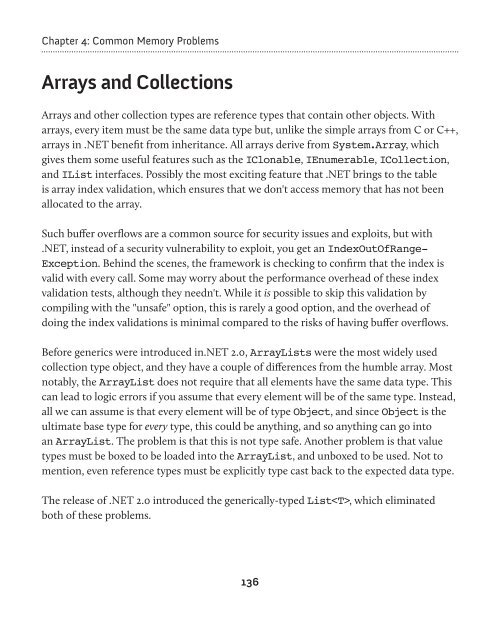Under the Hood of .NET Memory Management - Simple Talk
Under the Hood of .NET Memory Management - Simple Talk
Under the Hood of .NET Memory Management - Simple Talk
Create successful ePaper yourself
Turn your PDF publications into a flip-book with our unique Google optimized e-Paper software.
Chapter 4: Common <strong>Memory</strong> Problems<br />
Arrays and Collections<br />
Arrays and o<strong>the</strong>r collection types are reference types that contain o<strong>the</strong>r objects. With<br />
arrays, every item must be <strong>the</strong> same data type but, unlike <strong>the</strong> simple arrays from C or C++,<br />
arrays in .<strong>NET</strong> benefit from inheritance. All arrays derive from System.Array, which<br />
gives <strong>the</strong>m some useful features such as <strong>the</strong> IClonable, IEnumerable, ICollection,<br />
and IList interfaces. Possibly <strong>the</strong> most exciting feature that .<strong>NET</strong> brings to <strong>the</strong> table<br />
is array index validation, which ensures that we don't access memory that has not been<br />
allocated to <strong>the</strong> array.<br />
Such buffer overflows are a common source for security issues and exploits, but with<br />
.<strong>NET</strong>, instead <strong>of</strong> a security vulnerability to exploit, you get an IndexOutOfRange-<br />
Exception. Behind <strong>the</strong> scenes, <strong>the</strong> framework is checking to confirm that <strong>the</strong> index is<br />
valid with every call. Some may worry about <strong>the</strong> performance overhead <strong>of</strong> <strong>the</strong>se index<br />
validation tests, although <strong>the</strong>y needn't. While it is possible to skip this validation by<br />
compiling with <strong>the</strong> "unsafe" option, this is rarely a good option, and <strong>the</strong> overhead <strong>of</strong><br />
doing <strong>the</strong> index validations is minimal compared to <strong>the</strong> risks <strong>of</strong> having buffer overflows.<br />
Before generics were introduced in.<strong>NET</strong> 2.0, ArrayLists were <strong>the</strong> most widely used<br />
collection type object, and <strong>the</strong>y have a couple <strong>of</strong> differences from <strong>the</strong> humble array. Most<br />
notably, <strong>the</strong> ArrayList does not require that all elements have <strong>the</strong> same data type. This<br />
can lead to logic errors if you assume that every element will be <strong>of</strong> <strong>the</strong> same type. Instead,<br />
all we can assume is that every element will be <strong>of</strong> type Object, and since Object is <strong>the</strong><br />
ultimate base type for every type, this could be anything, and so anything can go into<br />
an ArrayList. The problem is that this is not type safe. Ano<strong>the</strong>r problem is that value<br />
types must be boxed to be loaded into <strong>the</strong> ArrayList, and unboxed to be used. Not to<br />
mention, even reference types must be explicitly type cast back to <strong>the</strong> expected data type.<br />
The release <strong>of</strong> .<strong>NET</strong> 2.0 introduced <strong>the</strong> generically-typed List, which eliminated<br />
both <strong>of</strong> <strong>the</strong>se problems.<br />
136











